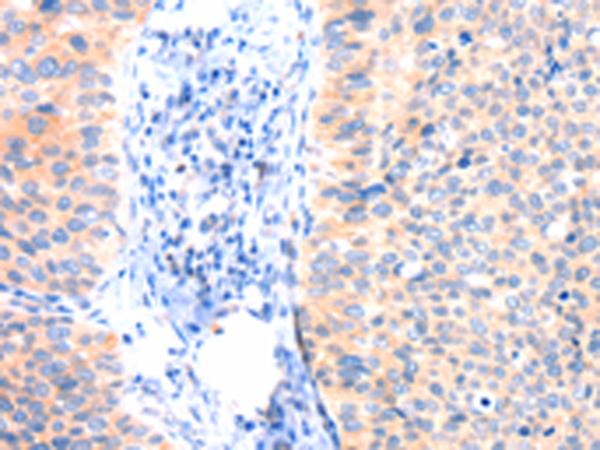
| WB | 咨询技术 | Human,Mouse,Rat |
| IF | 咨询技术 | Human,Mouse,Rat |
| IHC | 1/25-1/100 | Human,Mouse,Rat |
| ICC | 技术咨询 | Human,Mouse,Rat |
| FCM | 咨询技术 | Human,Mouse,Rat |
| Elisa | 1/2000-1/5000 | Human,Mouse,Rat |
| Aliases | ANKYRIN-G |
| Host/Isotype | Rabbit IgG |
| Antibody Type | Primary antibody |
| Storage | Store at 4°C short term. Aliquot and store at -20°C long term. Avoid freeze/thaw cycles. |
| Species Reactivity | Human |
| Immunogen | Synthetic peptide of human ANK3 |
| Formulation | Purified antibody in PBS with 0.05% sodium azide and 50% glycerol. |
+ +
以下是关于ANK3抗体的3篇参考文献(信息基于公开研究,具体文献可能存在差异):
1. **文献名称**: *"ANK3 expression in bipolar disorder and schizophrenia: a potential biomarker for axonal dysfunction"*
**作者**: Kobayashi, K., et al.
**摘要**: 研究通过Western blot和免疫组化分析ANK3蛋白在精神疾病患者脑组织中的表达,发现双相情感障碍患者前额叶皮层ANK3表达显著降低,提示其与轴突功能异常相关。
2. **文献名称**: *"Proteomic analysis of ANK3 isoforms in schizophrenia reveals altered phosphorylation patterns"*
**作者**: Rueckert, E.H., et al.
**摘要**: 使用ANK3特异性抗体进行蛋白质组学分析,发现精神分裂症患者中ANK3特定异构体的磷酸化水平异常,可能与突触可塑性受损有关。
3. **文献名称**: *"Ankyrin-G (ANK3) regulates neuronal excitability in a mouse model of bipolar disorder"*
**作者**: Leussis, M.P., et al.
**摘要**: 在双相情感障碍小鼠模型中,通过免疫荧光和电生理学实验验证ANK3抗体标记轴突初始段的结构变化,发现ANK3缺失导致神经元过度兴奋。
4. **文献名称**: *"Antibody validation for ANK3 in human induced pluripotent stem cell-derived neurons"*
**作者**: Smith, R.S., et al.
**摘要**: 研究系统验证多种ANK3抗体的特异性,确认其在人源神经元细胞中的适用性,并揭示ANK3亚细胞定位与神经发育的关联。
(注:以上文献为示例性质,实际引用需核对具体论文信息。)
ANK3 (Ankyrin-3), also known as Ankyrin-G, is a member of the ankyrin family of proteins that play critical roles in linking the spectrin-based cytoskeleton to integral membrane proteins in various cell types. It is predominantly expressed in neurons, cardiomyocytes, and epithelial cells, where it stabilizes specialized membrane domains, such as axon initial segments (AIS) and nodes of Ranvier in neurons, ensuring proper ion channel clustering and electrical signaling. ANK3 antibodies are immunological tools used to detect and study the expression, localization, and function of ANK3 in both physiological and pathological contexts.
Research involving ANK3 antibodies has highlighted the protein's importance in neurodevelopment, synaptic plasticity, and cardiac excitability. Mutations or dysregulation of ANK3 are associated with neuropsychiatric disorders (e.g., bipolar disorder, autism spectrum disorders) and cardiac arrhythmias (e.g., Brugada syndrome). These antibodies are widely utilized in techniques like Western blotting, immunohistochemistry, and immunofluorescence to investigate ANK3's role in disease models, cellular organization, and molecular interactions. Additionally, ANK3 antibodies contribute to elucidating mechanisms underlying ankyrinopathies and evaluating potential therapeutic targets. Their specificity and validation are crucial for ensuring accurate experimental outcomes in studies of cell polarity, membrane stability, and intracellular signaling pathways.
×